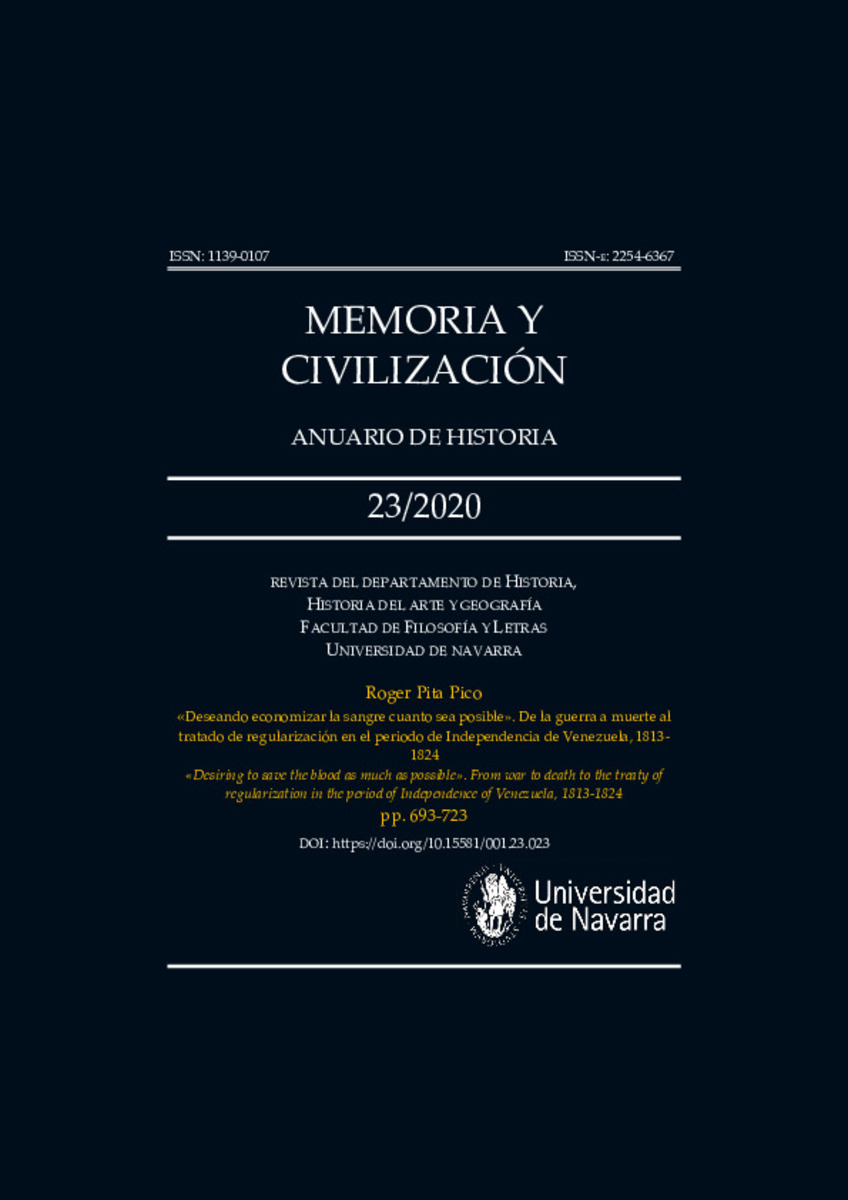Full metadata record
| DC Field | Value | Language |
|---|---|---|
| dc.creator | Pita-Pico, R. (Roger) | - |
| dc.date.accessioned | 2020-07-10 | - |
| dc.date.accessioned | 2021-08-17T08:26:44Z | - |
| dc.date.available | 2021-08-17T08:26:44Z | - |
| dc.date.issued | 2020 | - |
| dc.identifier.citation | Pita-Pico, R. (Roger). "«Deseando economizar la sangre cuanto sea posible». De la guerra a muerte al tratado de regularización en el periodo de Independencia de Venezuela, 1813-1824". Memoria y Civilización. 23, 2020, 693 - 723 | es |
| dc.identifier.issn | 1139-0107 | - |
| dc.identifier.uri | https://hdl.handle.net/10171/61268 | - |
| dc.description.abstract | This work is part of the commemoration of the bicentennial of Independence of the Latin American nations and it was carried out using the qualitative analysis method and the current of peace studies. The purpose is to analyze, from a comparative perspective, the situation experienced in Venezuela since 1813 with the war to death decree and the subsequent stage in the which were in force the humanitarian agreements signed in Trujillo in November 1820 between the Spanish government and the republican government, especially, emphasizing the application of the treaty of regularization of war. This dynamic of war with its different levels of intensity shows the complexity of the conflict in an environment of high social and ethnic polarization. Undoubtedly, those humanitarian standards marked a turning point in saving or alleviating the lives of hundreds of combatants, although it must also be recognized that there were many infractions and interference by some radical sectors. | en_US |
| dc.description.abstract | En el marco de la conmemoración del Bicentenario de la Independencia de las naciones hispanoamericanas y, a través del método de análisis cualitativo y de la corriente de los estudios de paz, el propósito de este artículo consiste en analizar, desde una óptica comparativa, la situación vivida en Venezuela a partir de 1813, cuando se promulgó el decreto de guerra a muerte y la posterior etapa en la cual estuvieron en vigencia los acuerdos humanitarios firmados en Trujillo en noviembre de 1820 entre el gobierno español y el gobierno republicano, en especial, haciendo énfasis en la aplicación del tratado de regularización de la guerra. Esta dinámica de la guerra con sus diferentes niveles de intensidad muestra la complejidad del conflicto, en medio de un ambiente de alta polarización social y étnica. Sin duda, aquellas normas humanitarias marcaron un punto de inflexión al salvar o aliviar la vida de cientos de combatientes, aunque debe reconocerse también que hubo muchas infracciones e interferencias por parte de algunos sectores radicales. | es_ES |
| dc.language.iso | spa | - |
| dc.publisher | Servicio de Publicaciones de la Universidad de Navarra | es_ES |
| dc.rights | info:eu-repo/semantics/openAccess | es_ES |
| dc.subject | Guerra | - |
| dc.subject | Trato humanitario | - |
| dc.subject | Independencia | - |
| dc.subject | España | - |
| dc.subject | Venezuela | - |
| dc.title | «Deseando economizar la sangre cuanto sea posible». De la guerra a muerte al tratado de regularización en el periodo de Independencia de Venezuela, 1813-1824 | es_ES |
| dc.title.alternative | «Desiring to save the blood as much as possible». From war to death to the treaty of regularization in the period of Independ-ence of Venezuela, 1813-1824 | en_US |
| dc.type | info:eu-repo/semantics/article | es_ES |
| dc.identifier.doi | 10.15581/001.23.023 | - |
| dadun.citation.endingPage | 723 | - |
| dadun.citation.publicationName | Memoria y Civilización | - |
| dadun.citation.startingPage | 693 | - |
| dadun.citation.volume | 23 | - |
Files in This Item:
Statistics and impact
Items in Dadun are protected by copyright, with all rights reserved, unless otherwise indicated.






